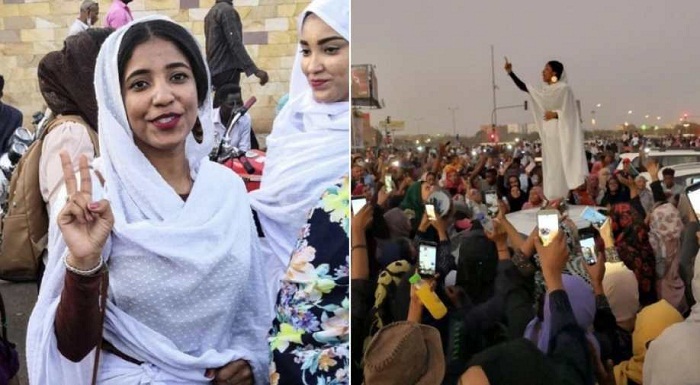Alaa Salah, a 22-year-old young Sudanese woman, emerged as icon women during country’s uprising.
Sudan’s military has overthrown the country’s longtime president, Omar al-Bashir. It’s a huge win for the hundreds of thousands of Sudanese protesters who have taken to the streets for months calling for his ouster — and for the brave women who have been a driving force in the protest movement.
Sudan’s Defense Minister Awad Mohamed Ahmed Ibn Auf announced Thursday that al-Bashir, who has been indicted by the International Criminal Court (ICC) on charges of committing genocide and crimes against humanity in Sudan’s Darfur region, had been taken into military custody. While it’s unclear if the military plans to turn al-Bashir over to the ICC for prosecution, it’s pretty clear that his brutal 30-year reign has come to a definitive end.
Much of the credit for al-Bashir’s removal goes to the women who have played a prominent role in the uprising that has swept the country and who have become the faces of the largely peaceful movement to topple the regime.
Earlier this week, an iconic photo of a woman named Alaa Salah, a 22-year-old engineering and architecture student, addressing protesters from atop a car went viral.
The image, captured by local photographer Lana Haroun, shows Salah standing on a white car surrounded by a sea of people outside the presidential compound and army headquarters in Khartoum, Sudan’s capital. Wrapped in layers of shimmery white fabric styled as a “toub” — a traditional Sudanese style of dress for women — and gold moon earrings, Salah towers over the crowd of protesters, her finger raised defiantly in the air.
A video of Salah leading protesters in songs and chants also went viral on social media. It shows Salah calling out, “In the name of religion, they killed us,” with the crowd responding, “Revolution!”
Her toub, and those worn by other women protesters, has become a symbol of freedom, strength, and solidarity in a country that has been suffering from a state of turmoil, oppression, and instability for decades under al-Bashir’s rule.
Salah and the thousands of other women who have been leading and participating in the protests are being referred to as “Kandaka” — the Nubian title for “queen.” They’ve become both the face of the movement to oust al-Bashir and a symbol of the struggle for women’s rights in Sudan.
